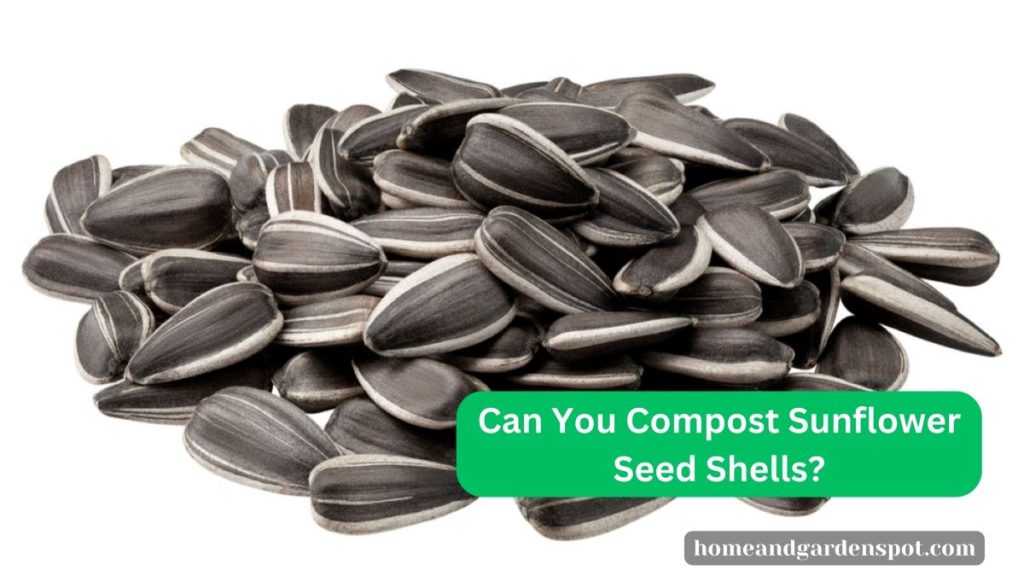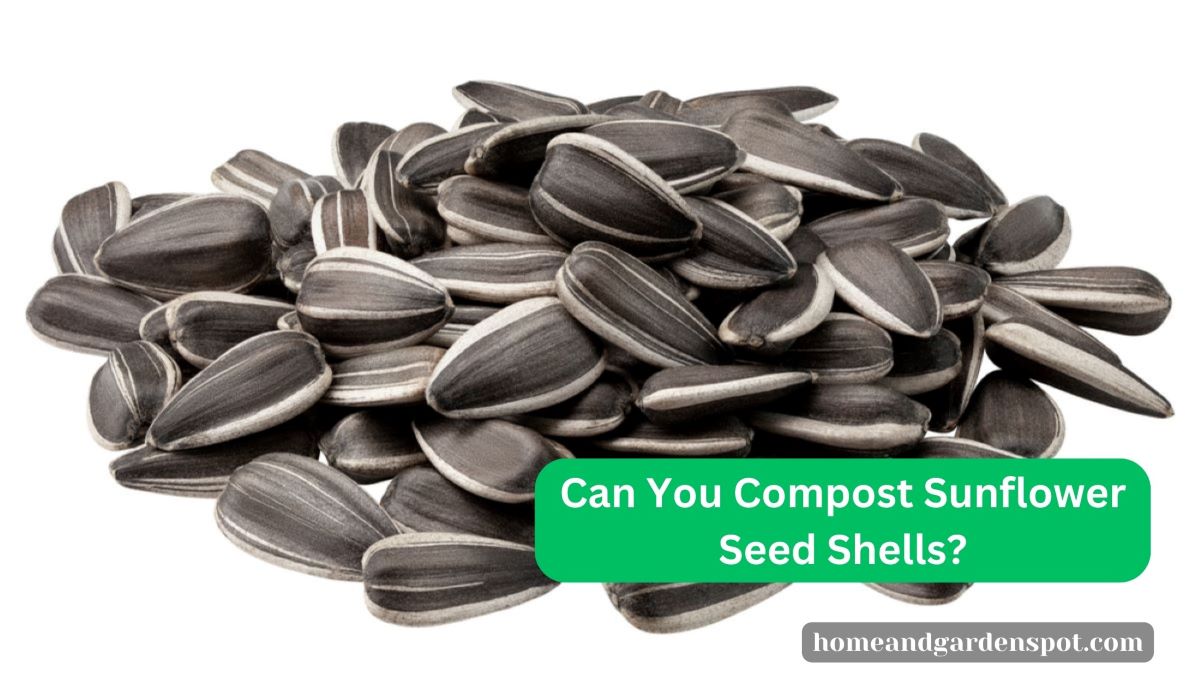Composting is an eco-friendly practice that has gained significant traction recently due to its positive environmental impact. It allows us to reduce waste, enrich the soil, and contribute to a more sustainable way of life.
However, when it comes to composting materials, can you compost sunflower seed shells?
Yes, you can compost sunflower seed shells if they are limited in quantity. Sunflower seed shells are allelopathic, meaning they produce a chemical that inhibits the growth of other plants.
Due to this property, sunflower seed shells are not suitable candidates for composting. However, some gardeners suggest using sunflower hulls as an all-natural weed-suppressing mulch in flower gardens, garden paths, and walkways.
Drawing from personal experience and expert knowledge in composting, I will discuss the intricacies of composting sunflower seed shells and provide valuable insights to help you make informed decisions in your composting journey.

Is Sunflower Seed Shells Good for Compost?
The truth is sunflower seed shells are not good for compost. However, because they are not good for composting doesn’t mean they can’t be composted.
It is possible to compost them if they are done in moderation. While they are technically organic material, sunflower seed shells can be slow to decompose and may cause some issues in your compost pile.
Sunflower seed shells are often quite tough and fibrous, which means they break down slowly.
This can lead to the accumulation of undecomposed shells in your compost, creating a coarse and undesirable texture in the finished product.
In addition, sunflower seed shells have a high carbon-to-nitrogen ratio, which can upset the balance in your compost pile.
Composting works best when there is a proper balance between carbon-rich “brown” materials and nitrogen-rich “green” materials.
Too many sunflower seed shells can tilt this balance, resulting in a compost pile that breaks down slowly and produces a less nutrient-rich compost.
My Opinion: To avoid these issues, it’s best to dispose of sunflower seed shells in your regular trash or find alternative uses, such as mulch in your garden paths or as a component of animal bedding.
How to Compost Sunflower Seed Shells
Step 1: Collect Sunflower Seed Shells
After enjoying sunflower seeds, start by collecting the empty shells. Store them in a container designated for compostable materials. Aim to gather a substantial quantity of shells to ensure an efficient composting process.
Step 2: Choose a Suitable Composting Area
Select an appropriate location for your compost pile or set up a bin. This area should have good drainage and aeration to support decomposition. A well-ventilated spot in your backyard or garden is ideal.
Step 3: Shred or Crush the Shells
Sunflower seed shells are naturally durable and can take a considerable amount of time to decompose if left whole.
To expedite the breakdown process, consider shredding or crushing the shells into smaller pieces. This increases their surface area, making it easier for microorganisms to break them down.
Step 4: Achieve Carbon-Nitrogen Balance
Successful composting relies on maintaining the right balance between carbon-rich (brown) and nitrogen-rich (green) materials.
Sunflower seed shells fall into the “browns” category due to their high carbon content.
To ensure a balanced compost pile, supplement the shells with nitrogen-rich materials such as kitchen scraps like cheese, grass clippings, or coffee grounds.
Step 5: Lay and Mix
When adding sunflower seed shells to your compost, layer them with other compostable materials rather than creating a thick, dense layer of shells alone.
Alternate between browns and greens to maintain a balanced ratio. Periodically turn or mix the compost pile to aerate it and encourage even decomposition.
Step 6: Monitor Moisture Levels
Check the moisture levels in your compost regularly. Sunflower seed shells can absorb moisture, potentially drying out the pile. Maintain a damp, but not soggy, consistency, similar to a wrung-out sponge.
Step 7: Utilize the Finished Compost
Once your compost is well-processed, it can enrich your garden soil. The nutrient-rich compost will improve soil structure and provide essential elements for healthy plant growth.
Lastly, composting sunflower seed shells may take some time, but you’ll notice progress with patience and regular observation. As the shells break down, they will contribute to the creation of nutrient-rich compost.
How Long Does It Take for Sunflower Seed Shells to Decompose?
Sunflower seed shells can take at least three years to decompose. They can be added to the compost heap, but it may take a long time for them to decompose.
Some experts suggest mixing them with organic matter to speed up the process. A research paper showed that co-composting sunflower seed shells with organic amendments resulted in better decomposition than other methods.
Are Sunflower Seed Shells Good Fertilizer?
Sunflower seed shells can be used as fertilizer, but they are not typically used as a primary source of nutrients for plants.
Sunflower seeds contain nitrogen, phosphorus, and potassium, which are essential nutrients for plant growth. However, the nutrient content in sunflower seeds is relatively low compared to commercial fertilizers.
To use sunflower seeds as fertilizer, you can grind them into a fine powder and mix them with soil or compost.
This can help improve soil fertility and provide some additional nutrients to plants. However, it’s important to note that the nutrient release from sunflower seeds may be slow, and they may not provide all the necessary nutrients in the right proportions.
For effective plant growth, it is recommended to use a balanced fertilizer that provides a complete range of essential nutrients in the right proportions.
Commercial fertilizers are specifically formulated to meet the nutritional needs of plants and ensure healthy growth and development.
What Are the Uses of Sunflower Seed Shells?
In case you are wondering what you can do with your sunflower seed shells, below are some of the things I do since they are not really good for composting:
1. Mulching
Sunflower seed shells are allelopathic, meaning they produce a chemical that inhibits the growth of plants around them.
This property makes sunflower seed shells suitable for use as mulch in established gardens and flower beds, as they can help suppress weeds. They can also be used to mulch garden paths and walkways.
2. Construction Materials
Sunflower seed shells have found their way into the construction trade in the form of Dakota Burl, a natural fiber wood paneling made from discarded sunflower seed shells.
These wood panels feature a swirled mixture of light and dark colors, similar to those commonly found in a sunflower seed shell.
Dakota Burl is an environmentally friendly alternative to other wood products, as sunflower seed shells are renewable, recycled waste products instead of wood produced from ancient, harvested trees.
The panels are typically used for wall paneling, cabinetry, furniture, and even award plaques.
3. Animal Feed
Sunflower seed shells can be used to feed ruminants such as cattle and sheep, providing roughage in their rations. The hulls contain ash, crude protein, lipid material, reducing sugars, and carbohydrates.
While they may be low in protein and nutritional value, their high fiber and carbohydrate content make them suitable for animal feed when mixed with ingredients that have higher nutritional value.
Conclusion
While it is indeed possible to compost sunflower seed shells, it requires careful consideration and proper composting practices.
Sunflower seed shells, being carbon-rich “browns,” can be slow to decompose on their own due to their tough and fibrous nature.
However, by breaking them into smaller pieces, balancing them with nitrogen-rich materials, maintaining adequate moisture and aeration, and patiently managing your compost pile, you can successfully incorporate sunflower seed shells into your composting efforts.

Leave a Reply